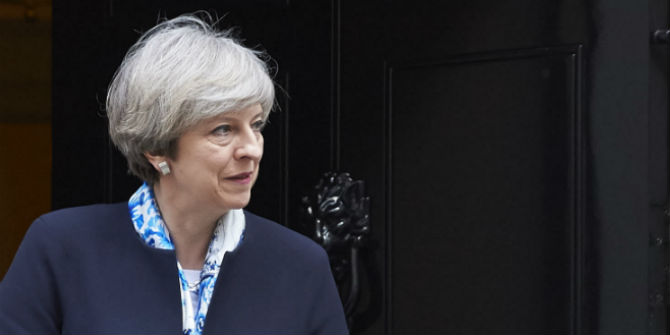 Theresa May drank deep from the poisonous well of Conservative Euroscepticism and did nothing to inform a public confused by Brexit about the trade-offs necessary for any deal. Her secretive and rigid approach was what led to her downfall, writes Oliver Daddow (University of Nottingham).
Theresa May drank deep from the poisonous well of Conservative Euroscepticism and did nothing to inform a public confused by Brexit about the trade-offs necessary for any deal. Her secretive and rigid approach was what led to her downfall, writes Oliver Daddow (University of Nottingham).
“Please don’t waste this time”, Donald Tusk warned the UK government after the EU agreed to extend the Brexit process until the end of October 2019. So what better time for the Conservative party to turf out Theresa May and install a fresh leader? May was the author of her own downfall, playing a difficult Brexit hand badly and ending up in a bunker of her own making. She is living proof that we do not get the politicians we deserve, but the politicians who tell us we deserve them.

Everyone knew what was coming when the PM hopefuls started inviting journalists into their kitchens, getting the stylists in, talking about their hobbies and showing off their wives in weekend newspaper hagiographies. The Conservative party had stayed true to historical form by levering out an electoral liability of a leader one day and showering her with praise the next.
May’s “teary farewell” expressing “regret” that she could not deliver Brexit sparked a furious debate about whether or not one should feel sorry for the outgoing prime minister. The impassioned nature of the discussion spoke volumes about the “hero-villain”, all-or-nothing framing of political debate in the UK, exacerbated by this polarising moment in the national journey. Our politicians are either “good”, or they are “bad”, leaving little time to reflect on the complexity of the characters in the drama.
There is no one way of feeling about May or any politician, but some sense of perspective can help. May herself will tell us about her “successes” in an inevitable and lucrative memoir deal that should prove easier to negotiate than Brexit. On the negative side, as Home Secretary and then as prime minister, May’s name will forever be deeply implicated in the Windrush scandal, the NHS and social care crisis, and a series of continued, burning inequalities and injustices in Britain that she claimed to be ready to remedy when she arrived in Downing Street in July 2016.
Inaction and strategic silence can reveal important aspects of a leader’s character and priorities (see also Jeremy Corbyn). May did not seem terribly bothered when it transpired that the Leave campaign had won the 2016 referendum on the back of financial irregularities and by breaching electoral law. In what may prove to be one of her legacies, it transpired that at the May 2019 European Parliament elections hundreds of EU residents in the UK were turned away from polling stations because of “clerical errors by local councils” that may now see the government in court. The disastrous Conservative showing at the ballot box was in no way unexpected.
And so to Brexit, where a combination of ideology, personal style and governing incompetence all go into the mix when evaluating May’s shoddy record. Having campaigned half-heartedly for Remain in the referendum, May put herself forward to succeed David Cameron. She then oversaw a closed decision-making process, surrounding herself with a tiny group of “yes-people” to do her bidding. This cabal ruthlessly briefed against dissenting opinions and were happy to let it be known at the time of the 2017 general election that they planned to “crush the saboteurs”. May, along with members of her government, variously went after judges for backing parliamentary scrutiny of Brexit, as well as academics, civil servants and anyone else deemed to be “betraying” the cause or casting too interrogative an eye over her strategy.
It is worth remembering that in the UK system prime ministers are incredibly powerful but nonetheless situated agents. It is true that May was dealt a bad hand with Brexit. But she played it worse. In attempt to head off criticisms that she was a covert Remainer undermining Brexit from within, she “Brexited-up” her governing team in July 2016, appointing a series of ministers manifestly not up to the task at hand. Boris Johnson at the Foreign Office, the hapless, blustering David Davis, “details man” Dominic Raab at the Department for Exiting the EU and Leader of the House Andrea Leadsom all resigned from May’s government to oppose her strategy and launch leadership campaigns outside the Cabinet. Fatally, in June 2017 she lost her parliamentary majority by calling a snap general election.
On the substance of the Brexit negotiations, May stuck rigidly to the negotiating red lines set out in her January 2017 Lancaster House speech, refusing to budge even when it was patently obvious that flexibility and creative new approaches were required. She seemed to care not a jot for planning how to deal with the vexed contingencies of the Irish border. She chose not to reach across party and parliamentary divides to build the necessary coalitions of support in the country, EU or – most damagingly of all – in parliament, leading to a humiliating series of losses for her constantly-repackaged Withdrawal Agreement Bill. Only in desperation did she finally sit down with Labour’s Jeremy Corbyn to try to hammer out a deal that might pass through parliament. When those talks broke down and May threatened to take her bill back for a fourth vote, the Conservative party decided to take Brexit out of her hands.
In communications, May thought short-term rather than long-term, spending her political capital on the Conservative-backing press and media rather than the public or European counterparts. At the precise moment when credible information and a sense of material realities were badly needed to inform a public confused by Brexit white noise, the UK was lumbered with a secretive prime minister who robotically emitted soundbites instead of conveying either the complexity of the process, or being willing to discuss the trade-offs inherent in any of the possible Brexit outcomes. Her early refrain that “no deal is better than a bad deal” effectively mainlined Conservative Euroscepticism into her Brexit policy, drastically limiting her room for manoeuvre and tempting her into attacks on the EU that created ill-will among the power-brokers in Brussels.
The Conservative party’s decision – and it was the party’s decision – to replace May with a new leader means that over the coming weeks the UK will be forced to listen to two conversations that may well determine the fate of Brexit and Britain’s place in the world. But they will largely be excluded from them. One will be conducted over the airwaves, on social media and in the national press between the leadership contenders themselves, in dialogue with their detractors, supporters, friends and – yes – relatives in the UK media.
The other, less public but no less significant, conversation will be between the leadership hopefuls and the 100,000 or so Conservative Party members who will enjoy an exercise in democracy even some dictators might find a tad autocratic. Yet ultimately, with the EU resolute in its stance that it will not reopen negotiations on the withdrawal agreement, if the new Conservative leader does not call a general election that decisively alters the parliamentary arithmetic, the same insoluble Brexit dilemmas will remain in place – with No Deal looming large on the horizon.
This post represents the views of the author and not the Brexit blog, nor LSE.
Oliver Daddow (@oliver_daddow) is Assistant Professor in British Politics and Security at the University of Nottingham. He is the author of Britain and Europe since 1945 (Manchester University Press, 2004), New Labour and the European Union (Manchester University Press, 2011) and is currently writing a book for Polity Press on British Exceptionalism from Empire through Brexit.







It was surely a nasty shock to many when May managed to scrape through the vote over her removal last December; those of us paying attention knew at least since the botched 2017 election (in which she chose to cook up her own manifesto behind closed doors with only her trusted fellow robots, duly producing a disastrous campaign even her own side couldn’t get behind, let alone the electorate it should have been written to attract) that she was completely unfit for the job, but her Parliamentary backers were afraid to remove her and lose a convenient combined scapegoat and roadblock.
The article is close in referring to her as “secretive”, but “duplicitous” would be more accurate. On Brexit, she put on a public show of Euroscepticism, appointing Eurosceptics to her show “Cabinet” – but then shutting them out and preferring the counsel of her own inner circle of Europhile advisors, the inner circle which had served her so badly in the 2017 election and went on to torpedo her whole term in office.
Important lessons to learn there for whoever takes over – and clearing out her baggage from Number 10 must be their first order of business.
Way back in the Brexit process it was agreed that there could be no border in Ireland, and the U K refused to contemplate a border across the Irish Sea under any circumstances
It doesn’t take a genius to reason that there could then be no “negotiated” Brexit – either a BINO where we allow free movement, comply with E U directives , and submit to the judgement of The European Court of Justice, or where we revoke the notification under Article 50.
Everything else is hogwash.
To “crash out” of the E U means having two separate political and economic entities. Where the the one jurisdiction stops and the other starts there is, what is called in common parlance “a border”.
If no border then no separate jurisdictions; if no separate jurisdictions then no (meaningful) Brexit.
The failure to be able to follow through such a simple logical process is just foolishness